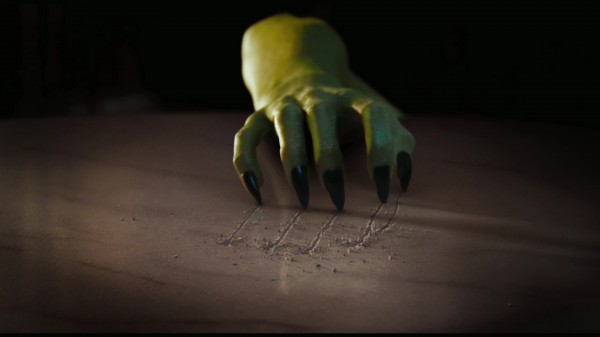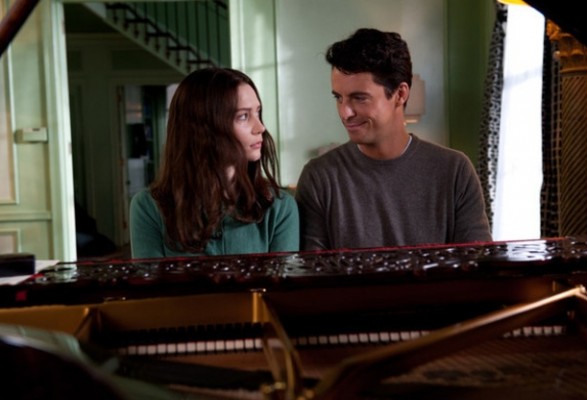
Welcome to the third annual Bitch Awards, celebrating the best and worst films and TV of the year. Stick around for the next two weeks as we raise a glass to our favourite works from 2013 (and duck as we unceremoniously throw the remote at our least favourites).
We’re almost at the top of our list of best and worst. Check out the films that come in at number two.
WORST
TVAngie
#5: The World’s End (Wright, 2013)
#4: Upstream Color (Carruth, 2013)
#3: Passion (De Palma, 2012)
#2: The Mortal Instruments: City of Bones (Zwart, 2013)
I don’t know why I keep watching these YA/tween-book adaptations, but I suppose the romantic in me hopes that one of them will actually turn out to be decent. Unfortunately, even with an all-star cast that includes Lena Headey, CCH Pounder, Jonathan Rhys Meyers and Jared frickin’ Harris, The Mortal Instruments: City of Bones is a dud.
The film follows young pouty-lipped Clary (Lily Collins) as she discovers she’s a shadow-hunter, a kind of particularly gifted warrior who helps to rid the world of demons walking amongst us. Her love interest and heartthrob guide is Jace (Jamie Campbell Bower) who, of course, shows up with long tousled hair, the right amount of guy-liner and an English-accent. Who could resist?
The performances on the whole aren’t that bad – although many of the adult actors are wasted since the focus is mainly on the angst-y teenagers. What’s really awful here is the script and the pacing: there’s no sense of urgency. Clary’s awakening begins once her mother, played by Headey, is abducted and the rest of the film is essentially the quest to find/rescue her. If Clary is so desperate to find her mother, who may very well be dead or near death, then why all the drawn-out interludes? The most grating is a yawn-worthy love triangle between herself, Jace and her long-time buddy, Simon (Robert Sheehan). In fact there are several instances of bizarre pacing that does the film no favours. Perhaps these are hold-overs from the novel, but if it’s going to be adapted to the big screen, some tightening up needed to occur.
The story also suffers from a lack of originality. We’ve already encountered Muggles vs. Wizards and Grimms vs. Wesens, so seeing gifted people battle demons that hide in plain sight to us ignorant humans feels pedestrian and repetitive. It’s been done before and done better.
But perhaps the most off-putting thing about this film is the revelation that SPOILER ALERT Jace is actually the brother of Clary (this is revealed after the two have shared a passionate make-out session and likely a dry-hump). I’m sure in a later book of the trilogy this will be cleared up as a hoax (for the love of god I hope it does) but in the film version, it’s vomit inducing. Incest?! Talk about a buzz kill that sullies the only reason hopeless romantics are attracted to this genre in the first place. What’s even worse is how the film decides to deal with this – as in it doesn’t dealt with AT ALL. Clearly, the film wasn’t intended as a stand-alone feature (a sequel had already been commissioned), meaning that you’d have to watch the entire trilogy (if it happens) for any kind of narrative resolution, or more likely shell out for the novels (since this first film bombed, we may never see the whole trilogy filmed).
I realize many of the film’s faults likely lie in its original source material, but the end result is the same: a crappy book yields a crappy film. If a film leaves me longing for the Twilight saga, then it rightfully deserves a place near the top of my worst list.
cinephilactic
#5: Hansel & Gretel: Witch Hunters (Wirkola, 2013) / G.I. Joe: Retaliation (Chu, 2013)
#4: Elysium (Blomkamp, 2013)
#3: The Bling Ring (Coppola, 2013)
#2: Oz the Great and Powerful (Raimi, 2013)

Courtesy of Walt Disney Pictures
Oh lord.
Sam Raimi has been in a rut for the last few years, so it’s no big surprise that his Disney-fied prequel to the Wizard Of Oz is a bastardization along the lines of Alice In Wonderland.
All of the goodwill James Franco earned in Spring Breakers is counteracted by this monstrosity, which fails to find anything meaningful to say about how a trio of witches became the cultural icons we know from Dorothy’s time in Oz. Not so spoiler alert: they’re basically just a bunch of foolish girls who tumble over themselves to impress a conman (Franco) who arrives in Oz in – what else? – a hot air balloon. One of the film’s main selling features is the mystery of which sister becomes the Wicked Witch, but viewers won’t have any problem figuring that out.
No one comes off well. Franco’s Oz is a sleazy playboy with a molustache (a molester mustache) whose entrance into the new world dictates the actions of every female for the remainder of the film. Rachel Weisz’s Evanora occasionally looks as though she’s having fun, but her character is so typically “Disney villain” that she’s little more than a crazed egomaniac in the climax. Mila Kunis fares worst as she has to play the (sexually) naive Theodora and is then promptly overshadowed by the green make-up and the history associated with the character. Her transformation scene is laughably done – a poor redux of Raimi’s better work in the Doctor Octopus scene in Spiderman 2.
Visually the film is a CGI monstrosity. A few examples, such as Joey King’s China Girl, are remarkable, but much of it is just a blur of ugly pixels that characters fail to interact with in a convincing fashion. This wouldn’t be a problem if the story was engaging, but it’s not. It’s a predictable bore, an insult to all viewers, even the children and families who comprise the film’s primary intended audience. In short, this film is not suitable for anyone – it’s the cinematic equivalent of “phoning it in” despite the obvious time – and money – spent on the visual effects. In Oz the Great and Powerful, no one comes out unscathed, especially audiences.
BEST
TVAngie
#5: The Book Thief (Percival, 2013)
#4: Gravity (Cuarón, 2013)
#3: The Act of Killing (Oppenheimer, Anonymous & Cynn, 2012)
#2: Prisoners (Villeneuve, 2013)
Prisoners is so high on my “Best” list not because it’s a flawless film, but because it stuck with me so long after I had watched it (a theme with this year’s picks). Canadian (woot) director Denis Villeneuve hasn’t disappointed me in the past with his breathtaking films Incendies (2010) and Polytechnique (2009), so I was anxious to see what his first English-language film would deliver. Much like his previous films, Prisoners makes you feel like someone sucker-punched you by the time the credits roll.
The film focuses on Keller Dover (Hugh Jackman) as he searches for his young daughter and her friend after they are abducted on Thanksgiving night, and concurrently, Detective Loki (Jake Gyllenhaal) who is tasked with finding the girls. Convinced that the police are doing nothing to find his daughter, Dover takes things into his own hands. He abducts and subsequently tortures Alex Jones (Paul Dano), a developmentally disabled man who likely saw the girls before they were abducted (or had a hand in abducting them himself – his role in the kidnappings is unclear). Here lies the film’s central quandary: is Dover justified in his brutal torture of Jones based on circumstantial evidence? I won’t spoil it for you, but the film forces you to wrestle with Dover’s actions and the fallout long after the film has ended.
What sells the film is its performances and direction – it’s clear that Villeneuve played a significant role in shaping what we end up seeing on screen. Jackman embraces the character wholeheartedly and is so convincing that I completely forgot about all his previous performances (goodbye Wolverine!). Every emotion is represented with an equal amount of intensity and commitment. Personally, I think it’s his best work by far. And Gyllenhaal, who played a similar role in Zodiac (2007), is an excellent counterpoint to Jackman. Viola Davis, Terrence Howard, Melissa Leo and Maria Bello all deliver superb supporting performances that elevate the film and contribute to its incredibly intense atmosphere. ‘Prisoners’ couldn’t be a more fitting title.
I should clarify that the film isn’t perfect, though. The plot meanders and could use some definite tightening, some things don’t quite make sense and the ending sequence should have been omitted entirely. But at the end of the day, this film is sure to get you thinking and talking and that’s a quality that is so rare nowadays. It’s likely not a film for everyone, but for me, it’s an incredibly memorable film and therefore earns a place on my best list.
cinephilactic
#5: Kon Tiki (Rønning & Sandberg, 2012)
#4: Jagten / The Hunt (Vinterberg, 2012)
#3: Spring Breakers (Korine, 2013)
#2: Stoker (Park, 2013)

Courtesy of Fox Searchlight Pictures
Similar to TVAngie’s description of Prisoners above, Stoker is a difficult film to recommend since it’s not for everyone. I remember when I saw it earlier this year, the film studies scholar in me was in awe of the formal techniques on display (the mise en scene, costuming, editing, etc). Meanwhile, my poor tortured husband spent two hours wondering whether or not to kill himself to end his agony.
All of this to say that the film is not for everyone. As directed by Chan-wook Park (in his English language debut), Stoker is a psychosexual drama about an extremely dysfunctional family. The film is loosely based on Hitchcock’s classic, The Trouble With Harry, though the logline is surprisingly non-descript: a teenage girl, India (Mia Wasikowskaa), loses her father and on the day of the funeral, her potentially murderous uncle Charlie (Matthew Goode) moves in and begins to woo both her and her mother, Evelyn (Nicole Kidman). Both mother and daughter are sexually repressed so a significant part of the film is how Charlie manipulates and pits them against each other as the bodies begin to pile up. This is memorably captured in several piano duets which become infused with sexual tension and jealousy.
The reason this film is on my ‘Best Of’ list is because of the way Park tells the story. As written by Wentworth Miller (of Prison Break fame), the story itself is quite threadbare – low on dialogue and long on silences. Together with the basic dark framework, Park turns the tale into a dazzling visual masterpiece, filled with memorable tableaux that – if they weren’t so gruesome – you would hang on your wall. Very little of this is presented in a conventional fashion; Stoker is much more of an art film than a horrific family drama which will challenge audiences looking for a faster paced tale. And although nearly every scene is laced with eroticism, very little is overt – if viewers aren’t paying attention, it can become very easy to miss the layers of meaning conveyed in the set design and the staging and framing of actors and objects.
If you’re willing to take the time, Stoker is well worth the effort. It’s just not for everyone.
—-
We’re almost at the top! Tomorrow we reveal our absolute favourite films of the year, as well as the ones that made our eyes bleed. Be sure to join us in 24 hours to find out what we’ve chosen, and let us know what you think of our #2 picks in the comments below.

